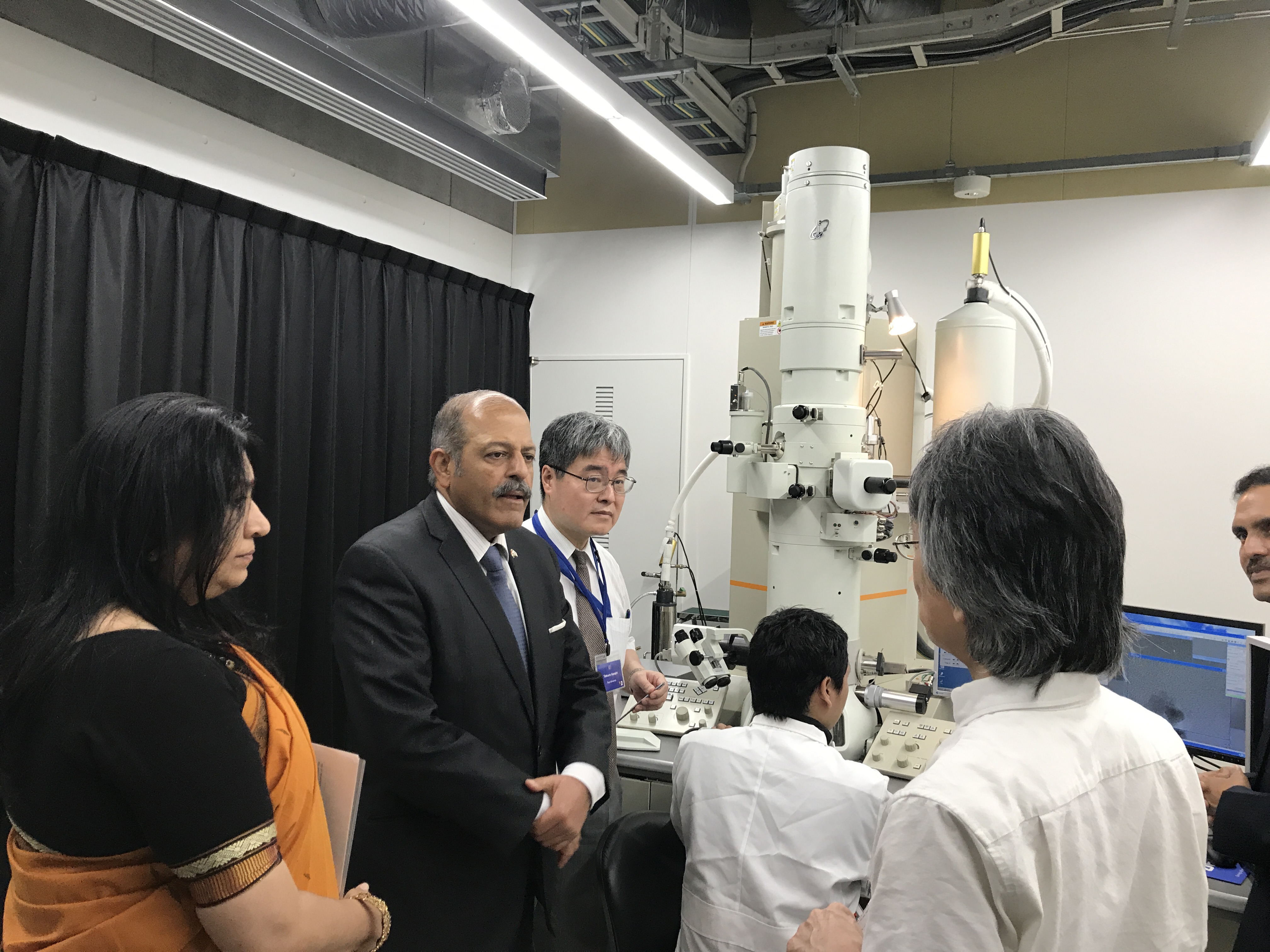Embassy of India
Tokyo
PRESS RELEASE
On 18 July 2017, His Excellency Shri Sujan R. Chinoy, Ambassador of India to Japan inaugurated the HAXPES (Hard X-ray Photoelectron Spectroscopy) facility-sharing programme between Bio Nano Electronic Research Institute (BNERC) of Toyo University, Japan, and the Nano Research Facility (NRF) of IIT, Delhi, India, in an interactive ceremony through video-conference held at the Kawagoe Campus of the Toyo University, located about 50 kms from Tokyo.
2. As soon as Ambassador Chinoy clicked to establish the virtual link, scientists at the BNERC, Toyo University, Japan fed the sample of Ms. Khushboo Agarwal, a research scholar in Physics at Nano Research Facility at IIT Delhi, into the Hard X-ray Photoelectron Spectroscopy (HAXPES). “This is a great feeling. This analysis is multi-layered and goes down to a depth of 40 nanometer" Khushboo said, with a visible sense of excitement. And, as the sample got analyzed, there were claps and cheers from the scientists of the two institutes who had assembled for this online video-conferencing demonstration.
3. In his address to the Japanese and Indian scientists and research scholars, Ambassador Chinoy said that “dedicating the HAXPES sharing facility located at BNERC with IIT, Delhi was a truly momentous event which reflected the deep trust and confidence between India and Japan under their Special Strategic and Global Partnership”. He spoke of “the historical bonds of Buddhism, the closer personal rapport between the leaders on both sides, and, the broad and growing support for closer engagement at the level of the scientific community, entrepreneurs and parliamentarians”. Ambassador Chinoy emphasized “the need to spread such sophisticated online collaboration to other institutions across both countries so that scientists on both sides could benefit from their respective work”. He called upon “Japanese institutions to make greater use of India’s youthful human resources to accomplish their own scientific research”. The collaboration is expected to be a game-changer in the research ecosystem, and will help in broadening the understanding of material science. The initiative will provide the students of IIT Delhi an excellent platform to operate a world class instrument while sitting in the lab back home and get more advanced composition and elemental bonding data.
4. Following this unique, first of its kind India-Japan collaboration involving an online facility-sharing arrangement of a latest, high-end spectroscopy instrument located at BNERC, Toyo University, Japan, students of IIT, Delhi, can now access the state-of-the-art equipment online for their research. The inauguration of the facility by Ambassador Chinoy was attended by Prof. Toru Maekawa, Director, Prof Sakthi Kumar, Deputy Director and other faculty members and students of BNERC, Toyo University. Prof. V. Ramgopal Rao, Director, Prof. B.R. Mehta, Dean, Research & Development and other faculty members of IIT Delhi participated in the inauguration event through video-conference.
5. BNERC, Toyo University and NRF, IIT, Delhi signed an MoU in 2013 and developed a joint Bio-Nano Mission Program, under which both institutes completed seven joint projects in the area of nanotechnology, biotechnology, bio-nanotechnology and material science leading to several high impact outstanding research publications. The program has been extended till March 2018. Both sides are expected to launch a dual doctoral degree programme soon.
6. Prof. Rao, Director, IIT Delhi termed the BNERC-IIT, Delhi collaboration as a very successful collaboration and said it was a benchmark for IIT-Delhi to follow. He added that “Although IIT, Delhi has many such collaborations with many other institutes around the world, the unique feature of this particular collaboration is online sharing of HAXPES. IIT, Delhi is setting up a US$ 20 million facility this year, which we offer to share with the Toyo University on a reciprocal basis. This way many high-end facilities could be used by faculty and students of both these institutes and will create sort of an exchange ambience and we are very keen to continue with this collaboration and take it to the next level.”
7. Prof. B.R. Mehta, Dean, Research & Development, IIT, Delhi and Prof. Joby Joseph, Associate Dean, Academics (P) of NRF, IIT, Delhi outlined the successful eight projects that have been successfully completed under this collaboration.
8. India and Japan have a longstanding and close partnership in science and technology since 1985, which was further strengthened with the signing of two MoUs during the recent visit of Prime Minister Narendra Modi to Japan in November 2016 - one for Space Cooperation, between ISRO & JAXA and the other between MoES & JAMSTEC for collaboration in Marine Science & Technology. The Department of Science & Technology (DST) of India and Japan Society for Promotion of Science (JSPS) have concluded several joint projects in many areas of fundamental science and have recently launched a DST-JSPS fellowship. DST and Japan Science and Technology Agency (JST) have established three joint research laboratories in the area of Artificial Intelligence, Internet of Things and Big Data. The Department of Bio Technology (DBT) of India and the National Institute of Advanced Industrial Science and Technology (AIST) of Japan have established six DBT-AIST Advanced International Laboratories for Advance Bio-Medicine (DAILAB), five of which are in India and one in Japan. The Government of India has also established an Indian Beamline at the Synchrotron Photon Factory at KEK, Tsukuba for study of advanced materials. Both countries have been strengthening collaboration in education through expanded institutionalized linkages between universities. Till date, around 600 Indian students and researchers have visited Japan under the SAKURA Science Plan (Japan-Asia Youth Exchange Programme in Science).

Date 19 July 2017



























